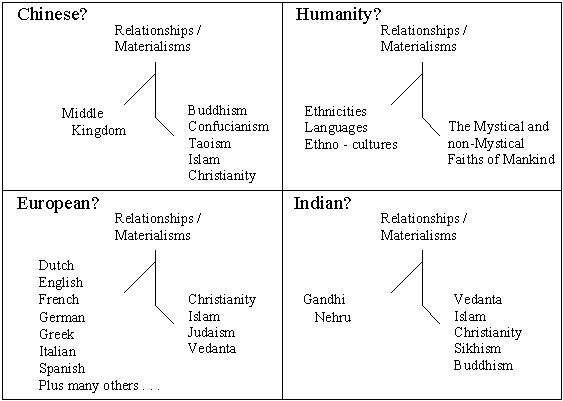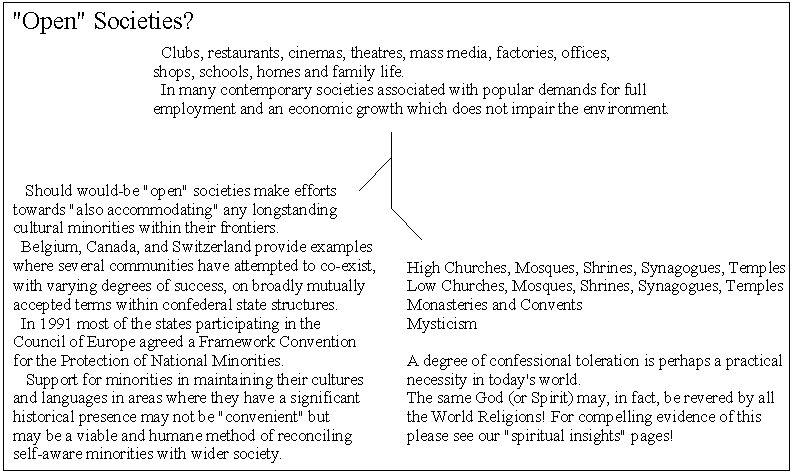Daniel Dennett - Breaking the Spell
Famous / Celbrity Atheists Atheism
Daniel Dennett was born in March, 1942, and spent some of his early years in the Lebanon where his father was employed
in some sort of intelligence role for the U.S. government.
He returned to the U.S. in 1947 with his mother and sister just after his father was killed in a plane crash. Daniel Dennett
was subsequently enrolled in Phillips Exeter Academy, a prominent private school, before later periods of study in Wesleyan University,
Harvard University (B.A. - 1963) and Oxford University (M. Phil. - 1965).
As of April, 2009, Daniel Dennett was the Austin B. Fletcher Professor of Philosophy, University Professor,
and Co-Director of the Center for Cognitive Studies (with Ray Jackendoff) at Tufts University.
Breaking the Spell: Religion as a Natural Phenomenon is a 2006 book by the American philosopher Daniel Dennett, which argues
for a scientific analysis of religion. Dennett implies that the spell he hopes to break
is not religious belief itself, but the conviction that religion is off-limits to scientific inquiry.
The book is divided into three parts. Part I Opening Pandora's Box discusses the motivation and justification for the entire project:
Can science study religion? Should science study religion? After answering in the affirmative,
Part II The Evolution of Religion proceeds to use the tools of evolutionary biology and memetics to suggest possible theories regarding the
origin of religion and subsequent evolution of modern religions from ancient folk beliefs. Part III Religion Today analyzes
religion and its effects in today's world: Does religion make us moral? Is religion what gives meaning to life?
What should we teach the children? Dennett bases much of his analysis on empirical evidence, though he often points out
that much more research in this field is needed.
The celebrity that Daniel Dennett's Breaking the Spell had brought him in the then newy emergent "New Atheism" led to his involvement,
early in 2007, with such similarly prominent atheists and rationalists as Richard Dawkins, Christopher Hitchens and Sam Harris
in the recording of a two-hour unmoderated discussion where their, sometimes conflicting, views were openly discussed between them.
During this discussion Daniel Dennett enunciated the following;-
Yeah, well I’m amused by it [the accusation that they are "strident or arrogant, or vitriolic, or shrill"], because
I went out of my way in my book to address reasonable religious people. And I test-flew the draft with groups of students who were deeply
religious. And indeed, the first draft incurred some real anguish. And so I made adjustments and made adjustments. And it didn’t do any
good in the end because I still got hammered for being for being rude and aggressive. And I came to realize that it’s a no-win situation.
It’s a mug’s game. The religions have contrived to make it impossible to disagree with them critically without being rude.
Nowhere else, from my experience, does something like this happen. “I think you’re wrong” is not an insult or a personal offense…
except in religion. I think this is a very important point.
Well, and too, there’s no polite way to say to somebody…
…do you realize you’ve wasted your life? Do you realize that you’ve just devoted all your efforts and all your goods to the glorification
of something which is just a myth? Or have you ever considered – even if you say have you even considered the possibility that maybe you’ve
wasted your life on this? There’s no inoffensive way of saying that. But we do have to say it, because they should jolly well consider it.
Same as we do about our own lives.

At Age-of-the-Sage we take the view that Daniel Dennett and others Famous / Celebrity Atheists and proponents of Atheism
and Rationalism are in
extreme danger of throwing out the "Baby with the Bathwater". That is to say that there exists an ultimately valid Spiritual Source
or Solace, and Enlightening Core of Truths, which
can be over-looked as a consequence of the all-too-human failings that have been accumulated across recorded time by the adherents of
Religions and, on a broader canvas, by the Faith Groups themslves.
We hope that our visitors will be very seriously intrigued by assessing how the "Poetical" wisdoms,
the "Inter-Faith" wisdoms and the "Christian" wisdoms that are collected on our site are both individually valid and also have
strong similarities despite their diversity of origin:-
Wisdom Quotes from the Great Poets
- A Disdain for Materialism
-
Poor and content is rich, and rich enough.
Shakespeare
- A Distrust of Intellect
- The intellectual power, through words and things,
Went sounding on, a dim and perilous way!
Wordsworth
- A Yearning for Divine Edification
- God guard me from those thoughts men think
In the mind alone;
He that sings a lasting song
Thinks in a marrow-bone;
Yeats
- Charity
- That best portion of a good man's life,
His little, nameless, unremembered acts
Of kindness and of love.
Wordsworth
- Purity of Heart
- A peace above all earthly dignities,
A still and quiet conscience.
Shakespeare
- Humility
- The best of men
That e'er wore earth about him, was a sufferer,
A soft, meek, patient, humble, tranquil spirit,
The first true gentleman that ever breathed.
Thomas Dekker
- Meekness
- Since my dear soul was mistress of her choice,
And could of men distinguish her election,
Sh'hath sealed thee for herself, for thou hast been
As one in suff'ring all that suffers nothing,
A man that Fortune's buffets and rewards
Hast ta'en with equal thanks; and blest are those
Whose blood and judgement are so well co-medled,
That they are not a pipe for Fortune's finger
To sound what stop she please: give me that man
That is not passion's slave, and I will wear him
In my heart's core, ay in my heart of heart,
As I do thee.
Shakespeare
Wisdom Quotes from Inter-Faith Sources
These spiritual insights quotations demonstrate the recognition of individual important Spiritual
Truths by
one of the world religions in the case of each "Truth":-
- A Disdain for Materialism
- Chuang Tzu put on cotton clothes with patches in them, and
arranging his girdle and tying on his shoes,
(i.e. to keep them from falling off),
went to see the prince of Wei.
"How miserable you look, Sir!" Cried the prince. "It is poverty,
not misery", replied Chuang Tzu. "A man who has TAO cannot be
miserable. Ragged clothes and old boots make poverty, not
misery".
Chuang Tzu - (Taoism)
- A Distrust of Intellect
- Sell your cleverness and buy bewilderment; Cleverness is mere
opinion, bewilderment intuition.
Rumi - (Islam)
- A Yearning for Divine Edification
- This I say therefore, and testify in the Lord, that ye
henceforth walk not as other Gentiles walk, in the vanity of
their mind. Having the understanding darkened, being alienated
from the life of God through the ignorance that is in them,
because of the blindness of their heart:
St. Paul - (Christianity)
- Charity
- He that does everything for Me, whose supreme object I am, who
worships Me, being free from attachment and without hatred to any
creature, this man, Arjuna!, comes to Me.
Bhagavad Gita - (Hinduism)
- Purity of Heart
- The path of the just is as the shining light, that shineth more
and more unto the perfect day. The way of the wicked is as
darkness: they know not at what they stumble.
Solomon - (Judaism)
- Humility
- Would you become a pilgrim on the road of love? The first
condition is that you make yourself humble as dust and ashes.
Ansari of Herat - (Islam)
- Meekness
- Let a man overcome anger by love, let him overcome evil by good;
let him overcome the greedy by liberality, the liar by truth!
Speak the truth, do not yield to anger; give, if thou art asked
for little; by these three steps thou wilt go near the gods.
Dhammapada - (Buddhism)
Wisdom Quotes from Christian Sources
A selection of wisdom quotes that demonstrate the profound depth of the insights that are recognised
by Christian authorities
are set out below. They are sourced from the Bible and
also from the works of Thomas a Kempis whose "Of the Imitation of Christ" ranks as the second
most widely read Christian text after the Bible itself.
- A Disdain for Materialism
-
Some have Me in their mouths, but little in their
hearts.
There are others who, being enlightened in their understanding
and purified in their affection, always breathe after things
eternal, are unwilling to hear of earthly things, and grieve to
be subject to the necessities of nature; and such as these
perceive what the Spirit of Truth speaketh in them.
For it teacheth them to despise the things of the earth and to
love heavenly things; to disregard the world, and all the day and
night to aspire after heaven.
Thomas a Kempis
- A Distrust of Intellect
- Beware lest any man spoil you through philosophy and vain
deceit, after the tradition of men, after the rudiments of the
world, and not after Christ.
St. Paul
- A Yearning for Divine Edification
- It is written, Eye hath not seen, nor ear heard, neither have
entered into the heart of man, the things which God has prepared
for them that love him. But God has revealed them unto us by his
Spirit: for the Spirit searches all things, yes, the deep things
of God.
...the natural man receives not the things of the Spirit of
God: for they are foolishness unto him: neither can he know them,
because they are spiritually discerned.
St. Paul
- Charity
- Beloved, let us love one another: for love is of God; and
every one that loveth is born of God, and knoweth God. He that
loveth not knoweth not God; for God is love.
St. John
- Purity of Heart
- Wherefore, my beloved, as ye have always obeyed, not as in my
presence only, but now much more in my absence, work out your own
salvation with fear and trembling. For it is God which worketh in
you both to will and to do of his good pleasure. Do all things
without murmurings and disputings: That ye may be blameless and
harmless, the sons of God, without rebuke, in the midst of a
crooked and perverse nation, among whom ye shine as lights in the
world;
St. Paul
- Humility
- Neither be ye called masters: for one is your Master, even
Christ. But he that is greatest among you shall be your servant.
And whomsoever shall exalt himself shall be abased; and he that
shall humble himself shall be exalted.
Jesus
- Meekness
- Wherefore, my beloved brethren, let every man be swift to hear,
slow to speak, and slow to wrath: For the wrath of man worketh
not the righteousness of God.
St. James
If any of our visitors were to be so open-minded as to give our presentation of the QUITE AWESOME
Wisdoms that have been won by the Mystics and Poets a fair hearing we believe that we can firmly establish
their opinion of the collective insights of said Mystics and Poets to being one of appreciation and respect.
|
|
 daniel dennett, breaking the spell, famous, celbrity, atheists
daniel dennett, breaking the spell, famous, celbrity, atheists daniel dennett, breaking the spell, famous, celbrity, atheists
daniel dennett, breaking the spell, famous, celbrity, atheists
